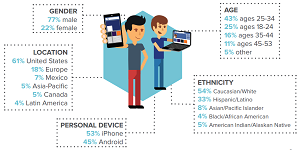News
Survey Reveals How to Keep Mobile Devs Happy
- By David Ramel
- October 15, 2015
Organizations wanting to retain their hard-to-find, pricey mobile app developers received some guidance from a new global survey that revealed their chief complaints are inflexible work conditions, too little time to do too much work and unrealistic expectations.
That information comes from the "Empowering Mobile Developers in 2015" report based on a survey of 497 developers conducted this summer by stablekernel, a development consultant company.
"These answers demonstrate managers must better understand the needs and processes involved in a development project," stablekernel said. "Additionally, managers should communicate regularly with their development teams to ensure alignment of expectations."
To keep hard-to-find and expensive mobile devs happy (and perhaps boost lagging mobile dev efforts), enterprises should improve communication, seek to understand the mobile development process better, provide relevant training and improve hiring strategies, the report indicated. "Developers perceive their leaders do not understand how software development and team capabilities translate into deliverables," stablekernel said. "When asked what can make their jobs easier, developers most frequently answered collaboration and communications tools." Regarding the latter finding, half of the developers reported that Slack was their favorite communications tool.
Regarding the need for improved training, the survey reported that 61 percent of respondents described themselves as being self-taught, with only 47 percent having received a formal development education (more than one answer was allowed). Another 32 percent received on-the-job training, while 9 percent were trained in internships and 4 percent in bootcamps.
 [Click on image for larger view.]
Who Are Developers? (source: stablekernel)
[Click on image for larger view.]
Who Are Developers? (source: stablekernel)
If there is such a thing as a typical mobile developer, the survey indicated this person would be a Caucasian/white male, aged 25 to 34, located in the U.S., preferring an iPhone over an Android device.
In fact, the developers reported being Apple-centric in more ways than one, with most targeting iOS apps with the Xcode IDE and Objective-C language, though Google Analytics was reported as the most popular analytics platform. And they're using these tools for native development by a wide margin: 85 percent reported favoring native development, with a preference for Web projects reported by 9 percent, and hybrid coming in last at only 6 percent (in contrast to other surveys that show a swing to the Web and preference for non-native development).
In conclusion, stablekernel offered several observations in addition to the finding that communication is key:
- The high demand for developers paired with the lack of streamlined education is causing inefficiencies and barriers to industry growth.
- Developers want a baseline of knowledge throughout an entire organization so there is less "lost in translation" and work is done more efficiently.
- With constant change in technology, developers need access to experts, learning opportunities with their peers and research time to stay on top of industry trends.
- In this survey, the younger generation proved to be less diverse than their older counterparts (so managers should focus on creating inclusive cultures, while training and hiring a more diverse group of workers).
- Despite lots of buzz around the Internet of Things (IoT) and hybrid applications, fewer developers work in these areas.
Stablekernel said the company itself is working to address the findings of its survey. "We believe developers who work hard, care about what they are working on, and continually improve their skills can create amazing things," the company said.
About the Author
David Ramel is an editor and writer at Converge 360.